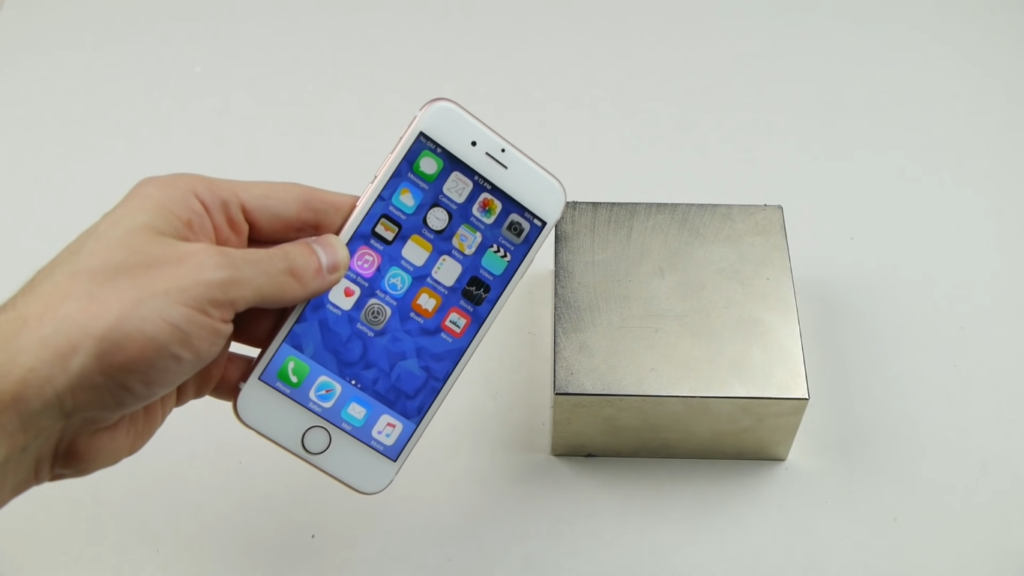Do neodymium magnets damage electronics? This is a question that we get asked all the time here at ElectronicsHacks. In this article, we will answer that question and provide you with some useful tips on how to protect your electronics from magnets. We will also cover some frequently asked questions about neodymium magnets and their effects on electronics.
What are Neodymium Magnets

These magnets have the highest magnetic strength (also called residual magnetism) of all permanent magnets available on the market today. Neodymium magnets are usually coated with a layer of nickel-copper-nickel plating to prevent corrosion and increase durability.
These powerful yet tiny materials offer advantages that other traditional types of magnets simply cannot match. Neodymium magnets can be found in a variety of shapes and sizes. They’re used for applications ranging from motors to medical instruments to jewelry making and more. Due to their high coercivity (resistance to demagnetization) and strong magnetic field strength, they can be used in some of the most demanding engineering applications.
Neodymium magnets are ideal for use in motors and generators because they’re capable of producing a stronger magnetic field than other types of magnets. This makes them much more efficient at transferring energy from one component to another, allowing motors and generators to be smaller and lighter without sacrificing performance. Additionally, their strong magnetism allows them to retain their magnetism over time unlike ferrite or ceramic magnets which tend to weaken slightly over time.
The downsides of neodymium magnets include their brittle nature (which requires careful handling), potential corrosion (due to the plating), higher cost compared to other magnets, and the need for special safety precautions due to their immense strength. Despite these drawbacks, neodymium magnets remain a popular choice among engineers and manufacturers thanks to their strong magnetic properties and cost-effectiveness in many applications.
Regardless of the application, neodymium magnets offer a powerful solution that simply cannot be matched by traditional ferrite or ceramic magnets. [1]
Can Neodymium Magnets Damage My Electronics?
However one huge concern with neodymium magnets and electronic devices is the potential for damage. Neodymium magnets have extremely strong magnetic fields, so they can interfere with or even damage nearby sensitive electronics. It’s important to ensure that any device being used around a neodymium magnet is secure and not exposed to the magnet’s field.
The devices are under a huge risks, are the devices that include a magnetic storage media, such as hard drives, tapes, and floppy disks. These devices may be damaged if brought in close contact with neodymium magnets. Even the weaker ferrite or ceramic magnets should also be kept away from these types of media to ensure they are not adversely affected.
In some cases, it might be necessary to use a neodymium magnet near an electronic device. In this case, it’s important to take proper precautions and make sure that all exposed electronics are properly shielded in order to prevent them from being affected by the magnetic field. As long as these safety measures are taken, then using a neodymium magnet near electronics shouldn’t pose any major risks. [1], [2]

Which Electronics are Safe From Magnet Damage
Still, not all electronics are vulnerable to these powerful magnets. In this section we shall discuss which electronic items are safe and which ones you should be careful around a neodymium magnet.
Cameras
Cameras are generally safe to use around neodymium magnets, as they have no internal components that would be affected by the magnetic field. However, it’s important to ensure that the camera is not too close to the magnet, as even a weak magnetic field could disrupt its operation.
USB sticks
USB sticks are typically safe around a neodymium magnet as long as you keep them a few cms away. The USB stick’s metal and plastic body protect the internal components from the magnetic field, so unless it is particularly powerful, it should be fine.
Smartphones
This might come as a huge surprise, but modern-day smartphones are actually pretty well protected against magnet damage. The reason for this is that most phones have an internal “shield” which keeps out any external magnetic interference. As long as you keep your smartphone cms away from a neodymium magnet, it should not be affected in any way.
Still, we advise keeping a close eye on any phone that you are using near a powerful neodymium magnet, just in case.
Car keys
Car keys are generally safe to use around neodymium magnets, as the magnetism in these objects is relatively weak. It’s also important to note that using a neodymium magnet near car keys could potentially disrupt their communication with the vehicle, so it’s best to avoid this situation altogether if possible.
Laptops
Laptops are generally safe when kept away from neodymium magnets. This is because most laptops rely on solid-state memory which isn’t affected by magnets. The same goes for smartphones, tablets, and other electronic devices with solid state memory.
However, even if a laptop doesn’t have any magnetic media components in it, the powerful fields of neodymium magnets could still damage the LCD screen or other sensitive components. For this reason, it’s still best to keep laptops as far away from neodymium magnets as possible. [1], [2]

How Far Should I Keep Neodymium Magnets From My Devices
Obviously you can’t just avoid using neodymium magnets near all of your electronics, so you should always keep a safe distance between them. Generally speaking, it’s recommended to keep any device at least between 30-60mm away from a neodymium magnet in order to avoid any potential risks. Of course, the farther away your devices are, the less likely they are to be affected by the magnetism.
It is also important to remember that different types of devices require different distances and levels of protection. For example, magnetic storage media such as hard drives or floppy disks should ideally be kept several metres away from any neodymium magnets in use. In addition, if you must use these items near neodymium magnets, make sure they are properly shielded to ensure no damage is done.
Finally, always use your common sense when using neodymium magnets near any type of electronic device. If in doubt, it’s best to keep them a safe distance away and follow the manufacturer’s instructions. With these tips in mind, you can safely use neodymium magnets around most electronics without worry. [1], [2]
What Other Safety Precautions Should I Keep in Mind
Still, it is important to take safety precautions even when using neodymium magnets around electronics. Not only will this ensure that your devices don’t get damaged, but it will also save you from potential harm. Here are some tips that can help you stay safe when using neodymium magnets!
Avoid magnets snapping together
To prevent this from happening, always keep your magnets away from each other and never store them in contact with one another. If you must handle multiple magnets at once, use tools like clamps or wooden blocks to keep them apart.
Do not try to cut or drill the magnets
While this one is pretty obvious, it’s worth mentioning that you should never attempt to cut or drill neodymium magnets. Not only could this cause the magnet to shatter and spread dangerous shards of metal, but it will also release a large amount of heat which can be harmful if not properly managed.
If you need to modify a neodymium magnet, take it to a professional who has experience working with these powerful objects. They will be able to do so safely and efficiently, saving you from potential harm.
Avoid getting your fingers in between the magnets
Another safety tip is to avoid putting your fingers in between two neodymium magnets. Not only could this potentially pinch and cut your skin as the magnets are pulled together, but it also poses a risk of serious injury due to the immense force exerted by these objects.
The best way to avoid getting hurt is to handle your magnets with care and keep them away from anything that you don’t want to be attracted to. When using multiple magnets at once, use tools such as clamps or wooden blocks to ensure that they stay separated.

Keep the magnets away from children
Finally, always keep neodymium magnets away from children. As these objects are incredibly powerful, they can be dangerous if not handled properly. Not only can they pinch and cut skin, but they can also cause serious injury or even death if swallowed.
For this reason, it is important to take extra precautions when storing and using neodymium magnets around kids. Make sure that the magnets are stored in a safe place out of reach and never allow children to handle them on their own. With proper supervision and care, you can ensure that your family stays safe around these powerful objects! [3]
FAQ
Can neodymium magnets damage phones?
No, neodymium magnets are not strong enough to damage phones, tablets, or other electronic devices – but be careful! If multiple neodymium magnets are brought near each other, the attractive force between them can be surprisingly large and could cause damage if they get too close.
It’s also important to keep neodymium magnets away from credit cards, hard drives, pacemakers, LCD monitors and televisions as these items can be affected by the magnetic field generated by the magnet. It’s best to use caution when handling any type of magnet near sensitive electronics.
Are neodymium magnets safe around computers?
Neodymium magnets are generally safe around computers as long as they are kept at a distance. Neodymium magnets, however, can cause permanent damage to the hard drive and other components if placed too close. The magnetic field generated by neodymium magnets is strong enough to erase data from the magnetized media such as floppy disks, credit cards with magnetic stripe, and even laptop hard drives.
It is best to keep neodymium magnets far away from any electronic devices or media that could be damaged by them. Additionally, do not allow children to play with neodymium magnets unsupervised as these items can pose a choking hazard if swallowed.
Can neodymium magnets damage laptops?
No, neodymium magnets are not powerful enough to damage laptops. Therefore, they do not pose any risk to your laptop or its components. However, it is important to keep them away from credit cards and other items that may contain a magnetic strip as these can be affected by strong magnets.
If you place them close to the extracted SSD or HDD drive, it may cause some damage if the drive contains some data. Therefore, it is best to keep neodymium magnets away from all computer components in order to avoid any damage that may occur. It is also recommended not to place them too close to your laptop’s monitor as this can interfere with its function.
Finally, be sure to store neodymium magnets away from other electronic devices or items that may contain a magnetic strip in case of accidental contact. This will ensure the safety of both your laptop and other objects in the vicinity.
Can magnets destroy electronic devices?
The answer to this question is usually, no. Magnets typically do not have enough power to destroy electronic devices; however, it is possible for an electromagnet (a device powered by electricity) to interfere with the functioning of some sensitive electrical components in a device. This interference can cause damage or even complete failure of the device. Additionally, very strong magnets may be powerful enough to attract loose parts and potentially cause physical damage, such as bending connectors and other components. It is important to take appropriate safety precautions when using any type of magnet around electronic devices, especially those containing delicate components like hard drives or LCD screens. It’s also best to avoid contact between magnets and magnetic material on the surface of a computer or other electronic device, as the results can be unpredictable. In general, it is safe to use magnets around your computer and other electronic devices; however, caution should always be taken when dealing with powerful magnets or sensitive components that are easily affected by magnetic interference.
Useful Video: What Happens If a Monster Magnet Meets an iPhone 6S?
Conclusion
Neodymium magnets are powerful and versatile tools that can be used in a variety of applications. They are relatively inexpensive and easy to find, making them an attractive choice for many projects. Despite their small size, neodymium magnets have the potential to generate tremendous amounts of force, making them invaluable in industrial settings.
However, these little magnets can also cause some serious harm if you’re not careful, especially electronics. For this reason, it’s important to take the necessary safety precautions when working with them. Avoid placing those near any device with magnetic storage, keep them away from small children, and always wear gloves when handling neodymium magnets. With the proper safety awareness and precautions, you can enjoy all the benefits of these powerful little tools.
References
- https://www.supermagnete.de/eng/faq/What-is-the-safe-distance-that-I-need-to-keep-to-my-devices
- https://simplymagnet.com/can-magnets-damage-electronics/
- https://www.amazingmagnets.com/t-neodymium-safety.aspx














Leave a Reply